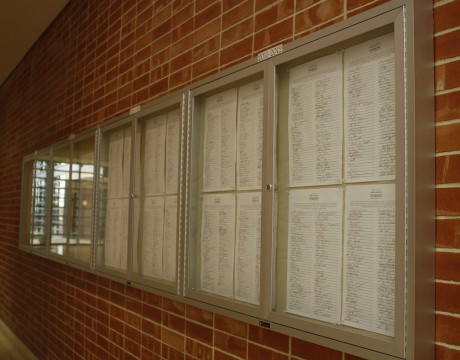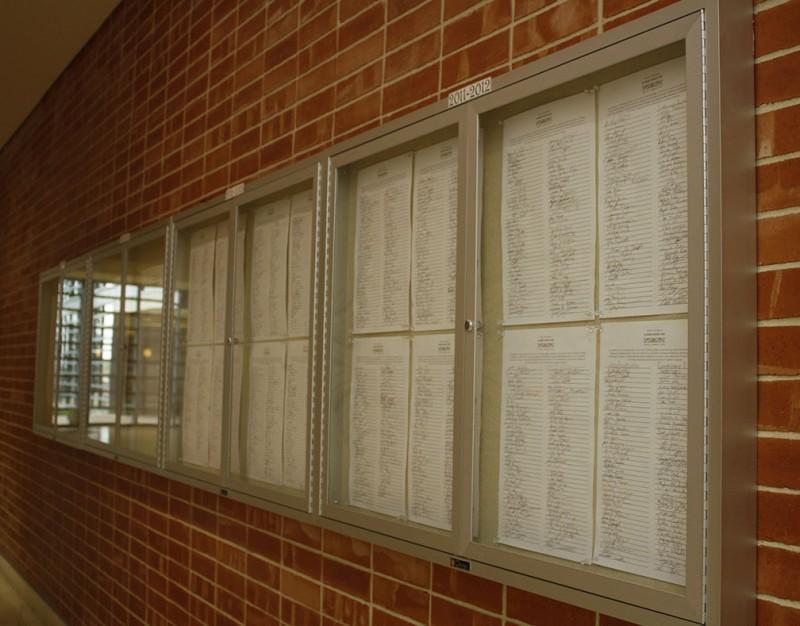
Members of the Trinity University Honor Council recently drafted, submitted and received approval for for a number of changes to the university Honor Code, including changes to the number of sitting members of the honor council and various other modifications, and are currently drafting a new set of proposals for consideration by the Association of Student Representatives (ASR) and the two voting faculty bodies.
“Last year we undertook some really basic changes given that many of [the provisions in the Honor Code] are outdated, inconsistent, and so forth,” said Mackenzie Brown, faculty advisor to the Honor Council and Jennie Farris Railey King professor of religion. “Those were relatively easy to get approved, so we did that.”
The first round of changes have already been passed in the Faculty Assembly, the Faculty Senate and the Association of Student Representatives, and have basically been approved by the administration, according to Brown, who also noted that the already-approved changes must be formally presented to the Trinity University Board of Trustees before they can take effect.
“The board does not vote on them, but they do need to be notified,” Brown said.
The still-to-be drafted changes will supposedly include a modification to language in the honor code regarding evidence standards as they relate to sanctions, according to Brown. The changes would also feature the inclusion of a deadline that would force ASR to complete its Honor Council recruitment process in a timely manner.
“We’ll work very hard to get [the second round draft of changes] done by the end of the school year, but then the faculty senate has to deal with it, and then it has to be sent out to the faculty as a whole,” Brown said. “They need thirty days before meeting.”
“That whole process [of making changes] has to be approved by the faculty senate, and ASR, and the faculty assembly, and then the president. It’s like three different bodies have to approve an honor code change or it doesn’t go into effect,” said Joe Moore, president of ASR.
According to Erin Frisch, internal chair of the Honor Council, the changes were primarily an integration of the council bylaws and the Honor Code into a single document, as well as a variety of modifications to the bylaws.
“Our main goal in making the changes was to integrate the Honor Code with our bylaws. The Honor Code is something that addresses fundamentally what the Honor Council is. Our bylaws address mainly procedural things, and that’s something we can change with a majority vote,” Frisch said. “The two documents address similar things, so we decided to integrate them so that it’s all there in one document.”
The changes to the Honor Code that have already been approved include an increase in the number of members from 19 to between 23 and 25, a change to the language that concerns anonymity for students who report Honor Code violations, and the inclusion of two deadlines that will require the ASR to fulfill its recruitment goals in a timely manner.
If the proposals take effect, ASR must fulfill its recruitment obligations for the Honor Council for the fall and spring semesters by Sept. 15 and Feb. 15, respectively.
The Honor Council also proposed that they formally take control of their recruitment process, which the Honor Council has had de facto control over for the last few years, according to Moore.
“At first we wanted to make our recruitment process reflect the practices of the past few years, which is the Honor Council ran our recruitment process and we would have ASR present at interviews, but it was ultimately Honor Council making the final call, ” Frisch said. “That changed after we presented to ASR, because this recent ASR is really gung-ho and on top of things, and they wanted to step into that role.”
The ASR disagreed with this point of view and retained their right to appoint members to the Honor Council.
“They wanted to change it [to] where they would make recommendations to us and we would confirm it, and the senate decided that we are going to keep it the way it is,” Moore said.
The ASR has since reasserted control over the Honor Council recruitment process. Technically, the ASR has had the mandate to act as a recruiter for the Honor Council for years, but they only recently found out.
“Earlier this year when I was reading through the Honor Code, I noticed that ASR was supposed to be the one in charge of appointing Honor Council,” Moore said. “No ASR president for the last few years has known that fact.”
The Honor Code changes were first developed last summer by students and faculty involved with the Honor Council, according to Frisch.
“We made our revisions over the summer. It was two students, Julie Stayon and McKenzie Quinn, and Curtis Brown. They worked over the summer to combine the Honor Code and the bylaws, and then they also tackled the changes that we made,” Frisch said.
The Honor Council began interviewing candidates for its most recent recruitment phase on Sunday, Feb. 5, and is no longer accepting applications.







